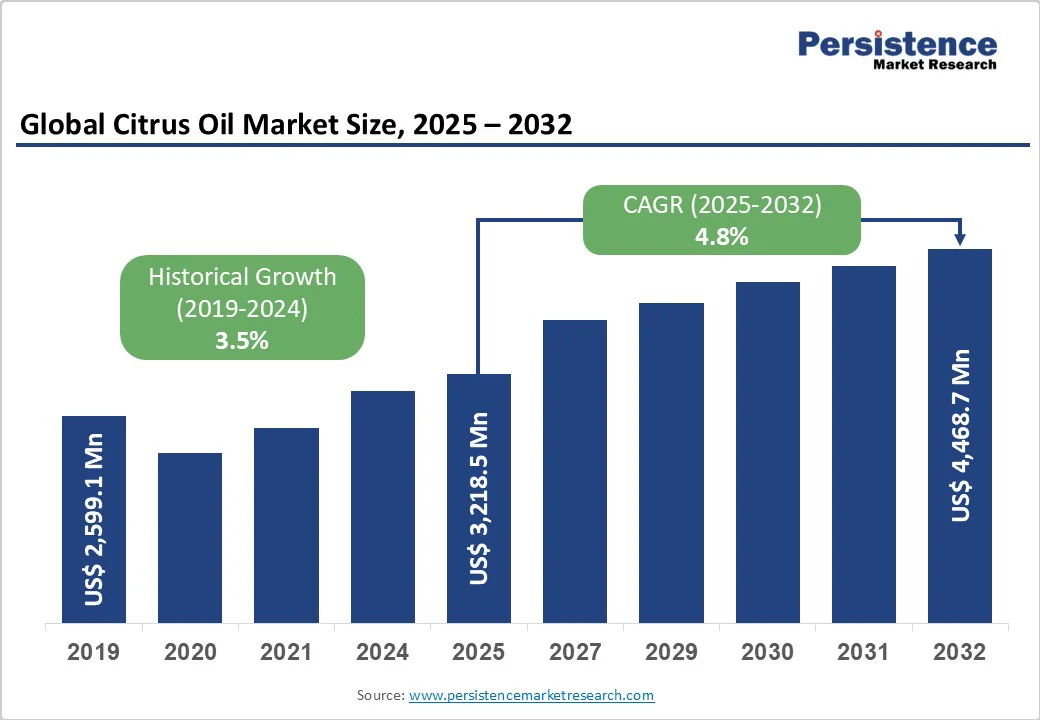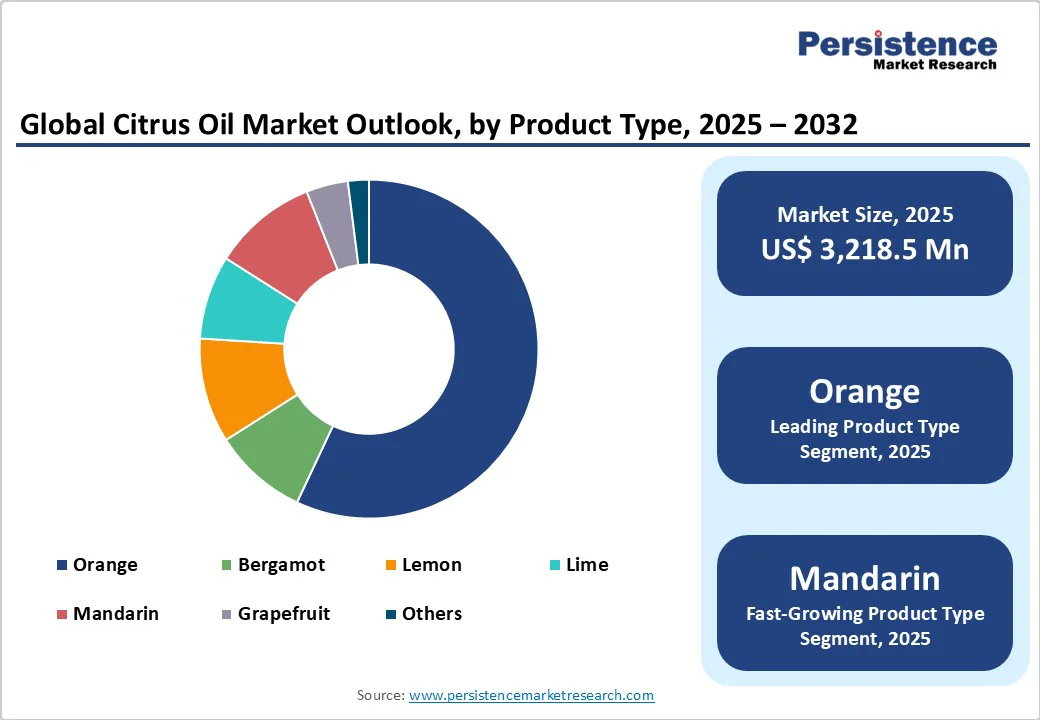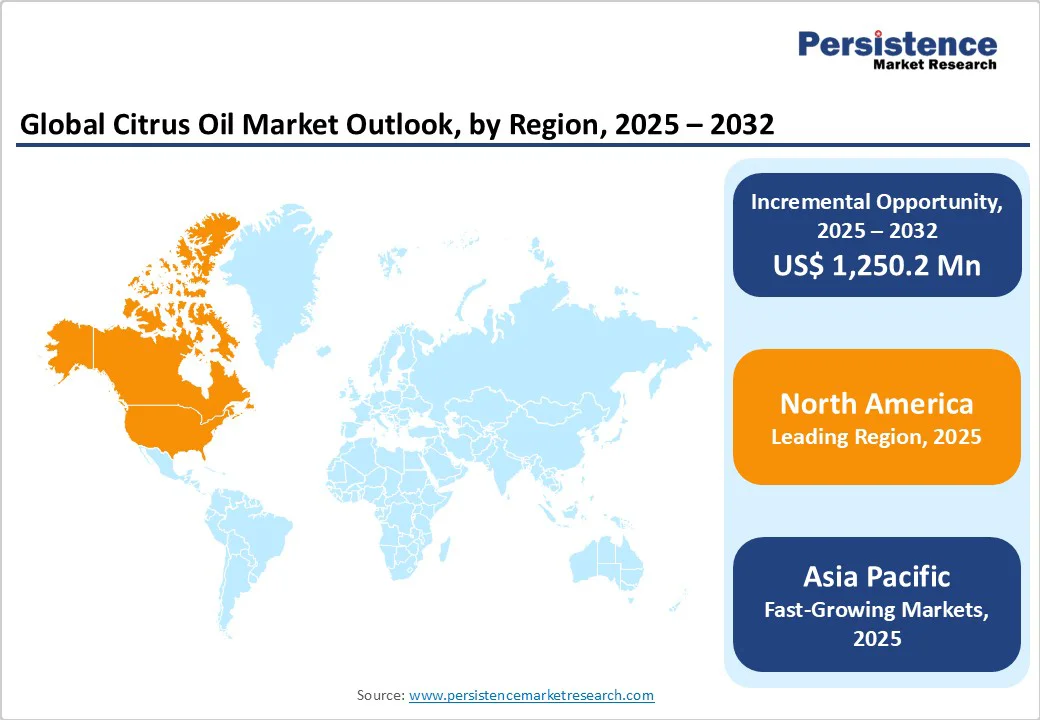ID: PMRREP11143| 221 Pages | 20 Oct 2025 | Format: PDF, Excel, PPT* | Food and Beverages

The global citrus oil market size is likely to be valued at US$3,218.5 Million in 2025 and is expected to reach US$4,468.7 Million by 2032, growing at a CAGR of 4.8% during the forecast period from 2025 to 2032, driven by rising focus on wellness and holistic health.
| Key Insights | Details |
|---|---|
|
Citrus Oil Market Size (2025E) |
US$3,218.5 Mn |
|
Market Value Forecast (2032F) |
US$4,468.7 Mn |
|
Projected Growth (CAGR 2025 to 2032) |
3.5% |
|
Historical Market Growth (CAGR 2019 to 2024) |
4.8% |

The rising focus on wellness and holistic health has significantly boosted the use of citrus oils in aromatherapy and stress-management practices. Oils such as orange, bergamot, lemon, and lime are increasingly incorporated into diffusers, massage oils, and bath products to promote relaxation, uplift mood, and reduce anxiety. Their natural, refreshing scents create calming environments in homes, spas, and wellness centers, enhancing mental well-being and supporting mindfulness routines.
Wellness-conscious consumers are seeking safe, plant-based alternatives to synthetic fragrances, driving the adoption of citrus oils across aromatherapy, yoga studios, and meditation spaces. The versatility of these oils also extends to personal care products and stress-relief formulations, making them a preferred ingredient. As lifestyle-related stress rises globally, demand for citrus oils in therapeutic and self-care applications continues to expand, creating substantial growth potential for manufacturers.
Citrus oil producers are grappling with major challenges stemming from seasonal harvest fluctuations and rising citrus fruit prices. According to the USDA, U.S. citrus production in the 2024–2025 season fell by 28%, the lowest level since 1919-1920. Orange production alone declined by 32.7%, while grapefruit saw a 27.4% drop. These sharp decreases are largely due to disease outbreaks, extreme weather conditions, and hurricanes.
As a result, the supply of raw materials for citrus oil extraction has tightened, causing price volatility and supply chain disruptions. To counter these impacts, producers are turning to alternative sourcing, investing in sustainable farming, and adopting flexible market strategies to maintain output and support long-term.
The rising focus on holistic health and natural remedies has created a promising opportunity for companies to formulate citrus-oil-based supplements targeting immunity, detoxification, and mood enhancement. Citrus oils, rich in antioxidants, vitamin C, and bioactive compounds, can be incorporated into capsules, gummies, or functional beverages to support immune resilience, liver detox pathways, and stress relief. Startups and established players can leverage the growing consumer preference for plant-based, clean-label, and natural supplements by creating targeted formulations with clear health benefits.
Innovative delivery formats, such as nanoemulsions or effervescent tablets, can enhance bioavailability and convenience. Additionally, marketing campaigns emphasizing mood-lifting, energizing, and detoxifying properties can differentiate products in a competitive wellness market, appealing to health-conscious consumers seeking daily functional supplementation.
Orange oil holds approximately 59% of the market share, reflecting its widespread versatility, consistent availability, and diverse applications across food, beverage, fragrance, and personal care products. Its sweet, familiar aroma and flavor profile make it highly appealing to manufacturers and consumers alike, driving robust demand worldwide.
Bergamot oil is prized for its distinctive floral-citrus fragrance and therapeutic applications in aromatherapy and perfumery, commanding a niche but growing segment. Lemon oil is valued for its fresh, zesty scent and multifunctional use in cleaning, flavoring, and wellness products, while lime oil offers a tangy, vibrant note popular in beverages, cosmetics, and aromatherapy. Together, these citrus oils complement orange oil’s dominance, expanding the overall market through specialized and premium applications.
Organic citrus oil is expected to grow at a CAGR of 8.7% during the forecast period 2025–2032 in the market, driven by rising consumer preference for natural, chemical-free, and sustainably sourced ingredients. Increasing awareness of health, wellness, and clean-label trends is encouraging manufacturers to incorporate organic citrus oils in aromatherapy, personal care, nutraceuticals, and food applications.
Organic certification assures consumers of eco-friendly cultivation practices, the absence of synthetic pesticides, and traceable supply chains, enhancing brand trust. Products such as organic orange, lemon, and bergamot oils are gaining traction for their superior quality, therapeutic benefits, and versatility. As wellness, immunity, and environmentally conscious consumption trends intensify globally, the organic citrus oil segment is poised for steady adoption across retail, industrial, and professional applications.

North America holds a prominent share in the market, driven by evolving consumer preferences in the U.S. and Canada. In the U.S., demand for clean-label, organic, and natural citrus oils is rising across food and beverages, personal care, and aromatherapy, fueled by increasing health and wellness awareness. Florida, a key producer, faces challenges from citrus greening disease and extreme weather, impacting production and supply chain dynamics.
In Canada, the market is expanding with a focus on premium, ethically sourced citrus oils. Consumers increasingly seek products aligned with sustainability and ethical practices, encouraging brands to highlight these attributes. Innovation is also notable, with citrus oils incorporated into wellness products, natural cleaning solutions, and other value-added formulations. Collectively, these trends indicate a strong growth trajectory for North American citrus oils, emphasizing natural, sustainable, and ethically sourced offerings.
The Asia Pacific region is projected to grow at a CAGR of 6.8% during the forecast period 2025-2032, driven by rising health awareness, increasing disposable incomes, and growing demand for natural and wellness-oriented products. In China, consumers are increasingly seeking natural wellness and personal care products, boosting the use of citrus oils in aromatherapy, skincare, and functional food applications.
The expanding middle class and health-conscious population are also fueling demand for premium, sustainably sourced ingredients. In India, citrus oils are gaining traction through integration into Ayurvedic and traditional medicine practices, alongside rising interest in natural personal care and dietary supplements. Both countries are witnessing innovation in product formulations, enhanced marketing of organic and ethically sourced oils, and greater adoption in home care and food applications, positioning Asia Pacific as a strategic growth market.

The global citrus oil market is fragmented, with a mix of established producers and agile startups competing through quality, innovation, and sustainability. On the supply side, companies are optimizing sourcing from major citrus-producing regions while ensuring traceability, organic certification, and sustainable farming practices.
Demand-side trends emphasize natural, wellness-focused, and clean-label products, with increasing adoption in aromatherapy, personal care, and functional foods. Innovations in extraction methods, blended oils, and organic formulations are driving differentiation. Branding, packaging, and clear labeling play critical roles in influencing consumer trust and choice. International trade flows continue to expand, with exporters targeting emerging markets in Asia Pacific and Latin America. Strategic partnerships, technological adoption, and sustainable practices are shaping competition, enabling players to capture evolving market opportunities and drive long-term growth.
The citrus oil market is projected to be valued at US$3,218.5 Million in 2025.
Increasing use of citrus oil in aromatherapy and stress-management practices drives the demand for citrus oil.
The citrus oil market is poised to witness a CAGR of 4.8% between 2025 and 2032.
Formulating citrus-oil-based supplements targeting immunity, detox, and mood enhancement is the key market opportunity.
Major players in the citrus oil market include Givaudan SA, Takasago International Corporation, Döhler, Firmenich SA, ADM, and LemonConcentrate S.L.
| Report Attribute | Details |
|---|---|
|
Historical Data/Actuals |
2019 - 2024 |
|
Forecast Period |
2025 - 2032 |
|
Market Analysis |
Value: US$ Mn |
|
Geographical Coverage |
|
|
Segmental Coverage |
|
|
Competitive Analysis |
|
|
Report Highlights |
|
By Product Type
By Nature
By Application
By Region
Delivery Timelines
For more information on this report and its delivery timelines please get in touch with our sales team.
About Author